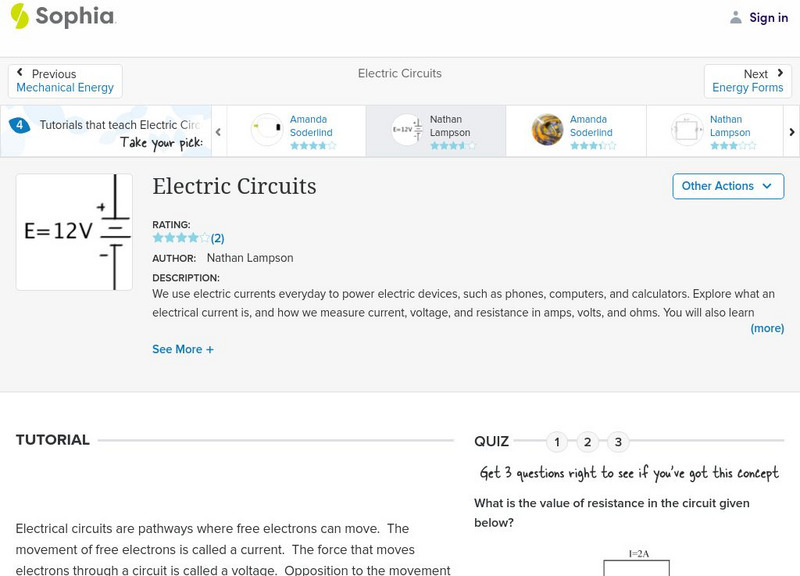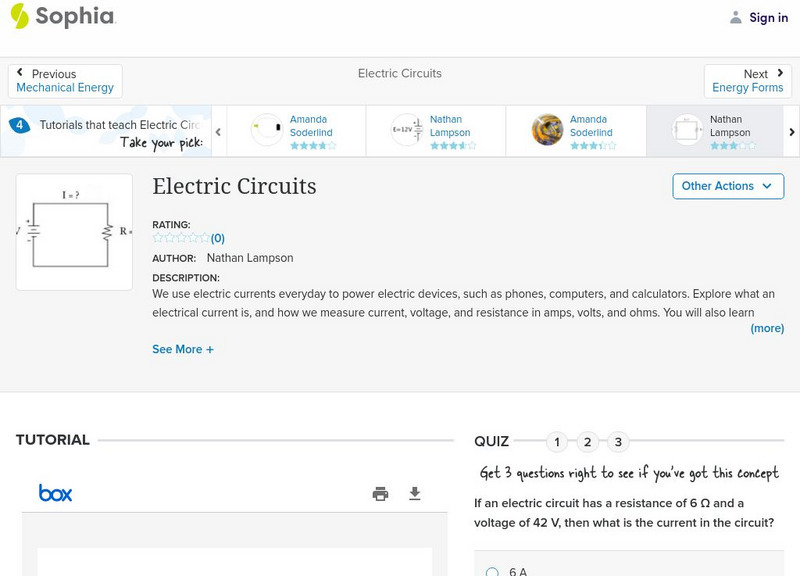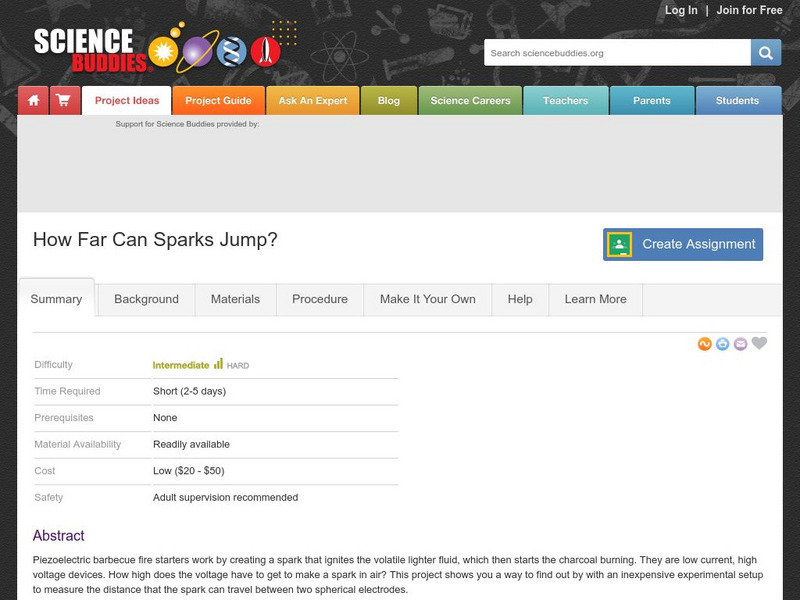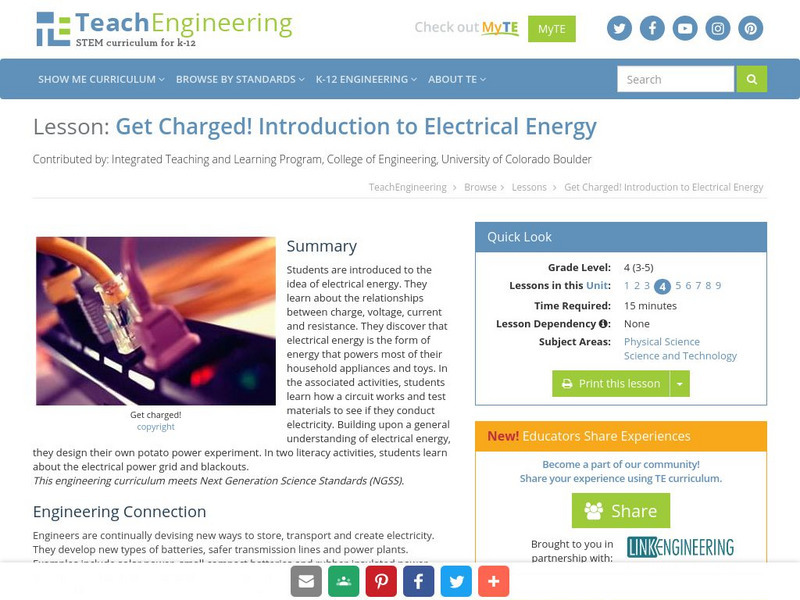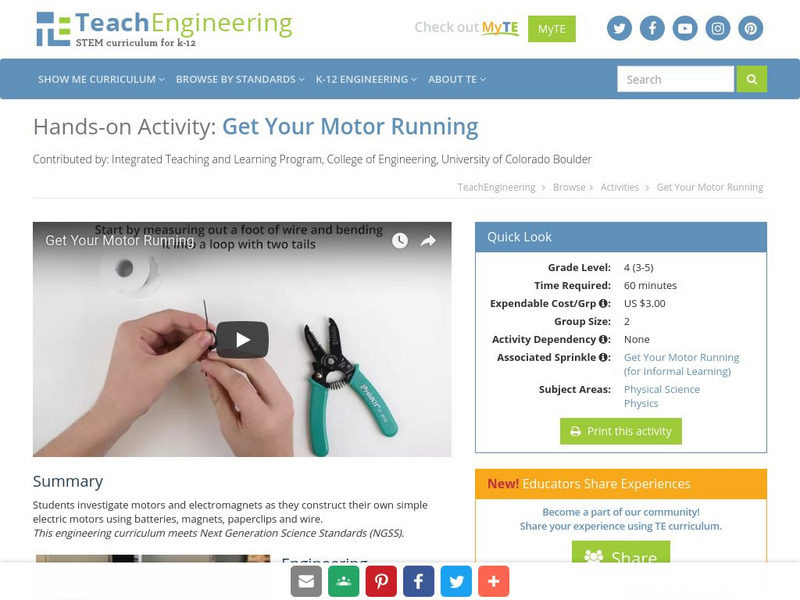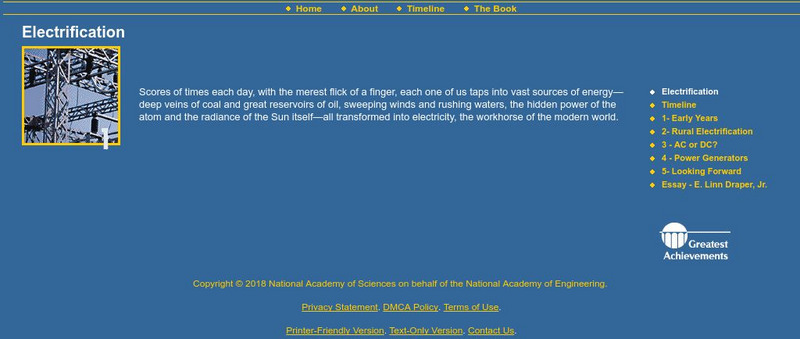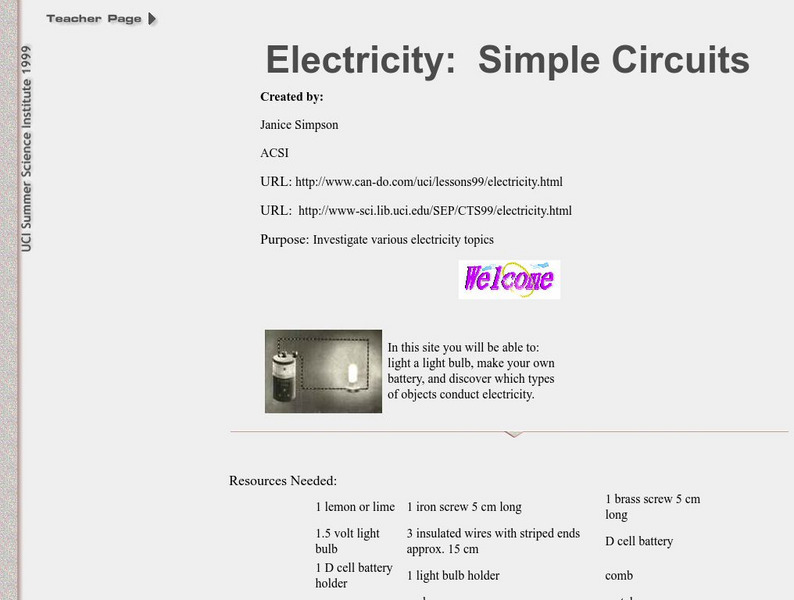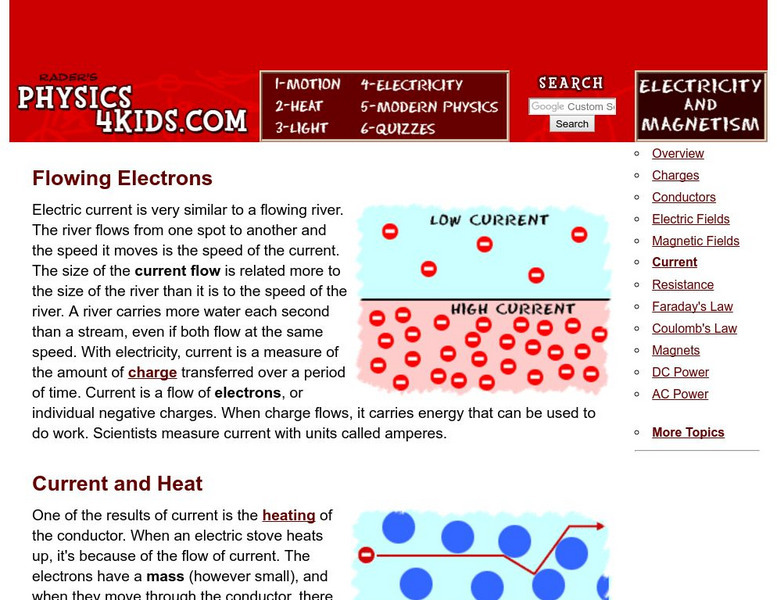National High Magnetic Field Laboratory
Magnet Academy: Timeline of Electricity and Magnetism: 1880 1889
Nikola Tesla and Thomas Edison duke it out over the best way to transmit electricity and Heinrich Hertz is the first person (unbeknownst to him) to broadcast and receive radio waves.
Read Works
Read Works: Electricity & Energy Circuits
[Free Registration/Login Required] An informational text about electric circuits. A question sheet is available to help students build skills in reading comprehension.
National High Magnetic Field Laboratory
Magnet Academy: Induced Current
A current can be induced in a conducting loop if it is exposed to a changing magnetic field. (Java tutorial)
Other
Tesla Memorial Society of New York: Nikola Tesla
This article provides information regarding Nikola Tesla, inventor, electrical engineer, mechanical engineer, physicist, and futurist best known for his contributions to the design of the modern alternating current electricity supply...
Robin Chew
Lucid Cafe: Nikola Tesla
Learn here about Nikola Tesla, nventor, electrical engineer, mechanical engineer, physicist, and futurist best known for his contributions to the design of the modern alternating current electricity supply system.
Sophia Learning
Sophia: Electric Circuits: Lesson 2
This lesson will explain how to calculate voltage, current, and resistance in simple electric circuits. It is 2 of 4 in the series titled "Electric Circuits."
Sophia Learning
Sophia: Electric Circuits: Lesson 4
This lesson will explain how to calculate voltage, current, and resistance in simple electric circuits. It is 4 of 4 in the series titled "Electric Circuits."
Science Buddies
Science Buddies: Build a Reed Switch Motor
After building a simple electric motor from a kit, with this experiment you can explore how voltage affects motor speed. The Science Buddies project ideas are set up consistently beginning with an abstract, objective, and introduction,...
Science Buddies
Science Buddies: How Far Can Sparks Jump?
Piezoelectric barbecue fire starters work by creating a spark that ignites the volatile lighter fluid, which then starts the charcoal burning. They are low current, high voltage devices. This project shows you a way to find out by with...
TeachEngineering
Teach Engineering: Get Charged!
Students are introduced to the idea of electrical energy. They learn about the relationships between charge, voltage, current and resistance. They discover that electrical energy is the form of energy that powers most of their household...
TeachEngineering
Teach Engineering: Lights Out!
This lesson introduces the concept of electricity by asking young scholars to imagine what their life would be like without electricity. Two main forms of electricity, static and current, are introduced. Students learn that electrons can...
PBS
Pbs: Rough Science: Island Power Plant
Learn how to create electricity and your own electrical gadgets! Site provides users with information on how to make a battery, flashlight, buzzer an electric motor.
Massachusetts Institute of Technology
Mit: Inventor of the Week: Nikola Tesla: The Electro Magnetic Motor
Use this site to learn about the inventor of the electro-magnetic motor, Nikola Tesla. Find out why Tesla's experimentation with alternating current was so important to later inventions and use of electricity.
National High Magnetic Field Laboratory
Magnet Academy: Pixii Machine
This "magneto-electric machine" was the first to turn motion into electricity. (Java tutorial)
Science Museum, London
Science Museum: Pocket Motor
Teacher directed activity shows students how flowing electrical current produces a magnetic field by building a simple motor.
TeachEngineering
Teach Engineering: Completing the Circuit
In the everyday electrical devices we use - calculators, remote controls and cell phones - a voltage source such as a battery is required to close the circuit and operate the device. In this hands-on activity, students use a battery,...
Other
California Energy Commission: Coloring Book
At this site from California Energy Commission, you can learn more about electricity safety with this coloring book. Teach children how to use electricity safely.
Exploratorium
Exploratorium: Science Snacks: Magnetic Pendulums
See how electricity and magnetism interact with this activity. Activity has students creating a current by swinging a copper coil through a magnetic field. The copper coil will start a second coil swinging as well.
National High Magnetic Field Laboratory
Magnet Academy: Transmission Lines
Electricity goes through some ups and downs on its way from the power plant to your house. See how it works in this interactive activity.
Physics Classroom
The Physics Classroom: Electric Circuits: Circuit Builder
Students manipulate this virtual electronic circuit board where they can add resistors, light bulbs, wires, and ammeters to build a circuit, explore Ohm's law, and compare and contrast series, parallel, and combination circuits. Three...
TeachEngineering
Teach Engineering: Get Your Motor Running
Students investigate motors and electromagnets as they construct their own simple electric motors using batteries, magnets, paper clips and wire.
National Academy of Engineering
Greatest Engineering Achievements of the 20th Century: Electrification
Learners explore electrification in the 20th century. Some topics investigated are rural electrification, power generators, and direct current (DC). The resource consists of historical information, a timeline, and a personal essay by a...
Other
Electricity: Simple Circuits
Create your own simple electric circuit. Using simple supplies build your own battery and investigate conductivity. You can also construct a crossword puzzle with electrical vocabulary words.
Physics4kids
Physics4 Kids: Electricity and Magnetism: Current
Explains electric current, how it produces heat, and the difference between a direct current and an alternating current.
Other popular searches
- Static and Current Electricity
- Bill Nye Current Electricity
- Current Electricity Test
- Current Electricity Power
- Electricity Circuits Current
- Current Electricity Review
- Static or Current Electricity
- Statc or Current Electricity
- Static Electricity Current
- Electricity Current







